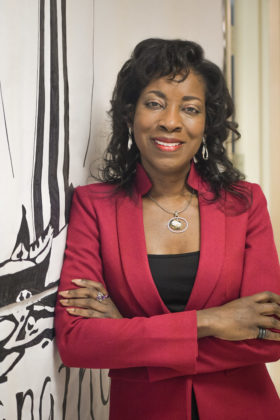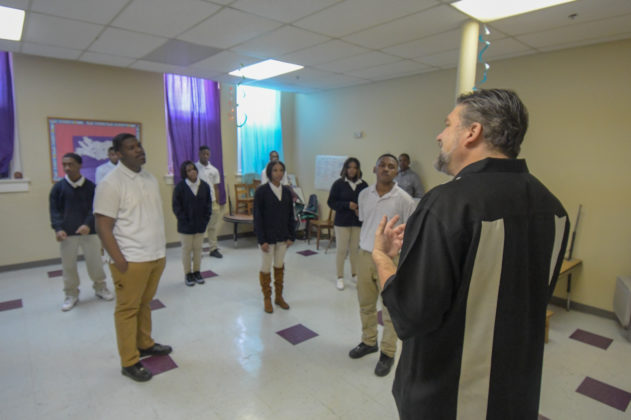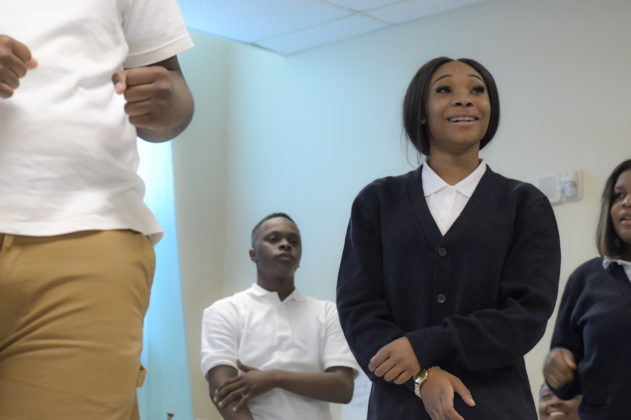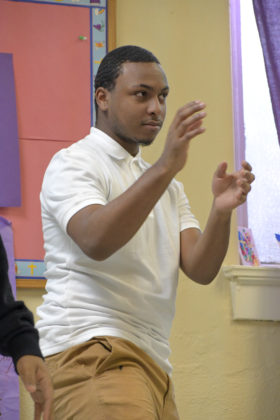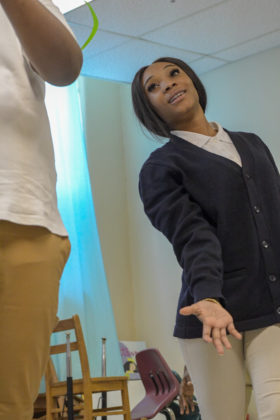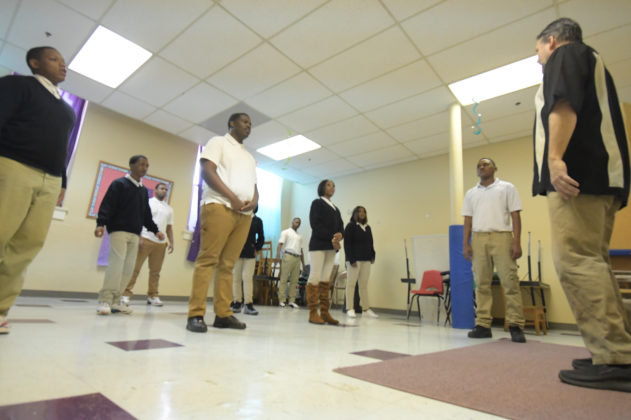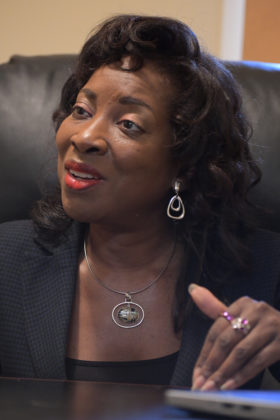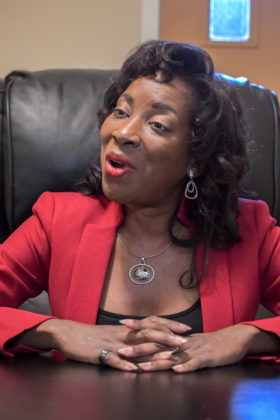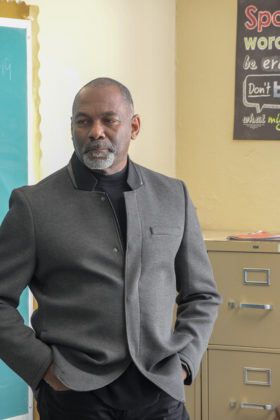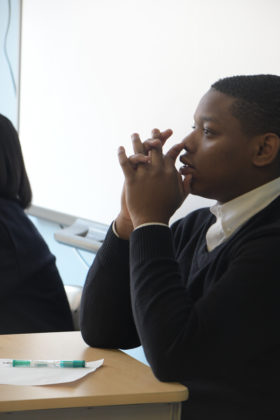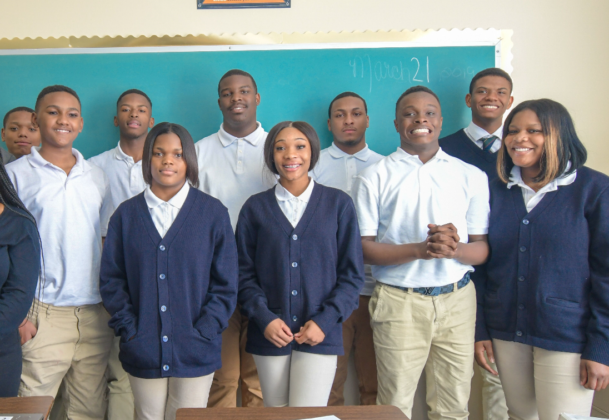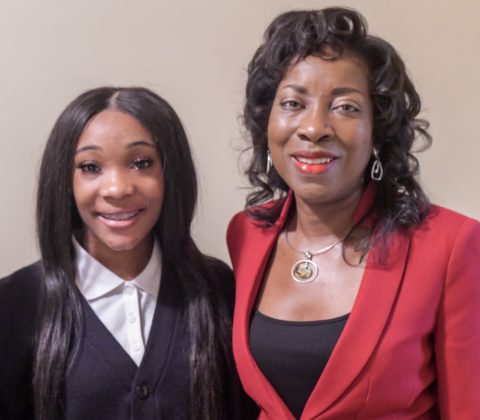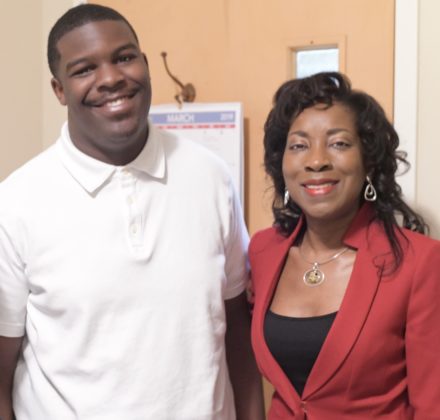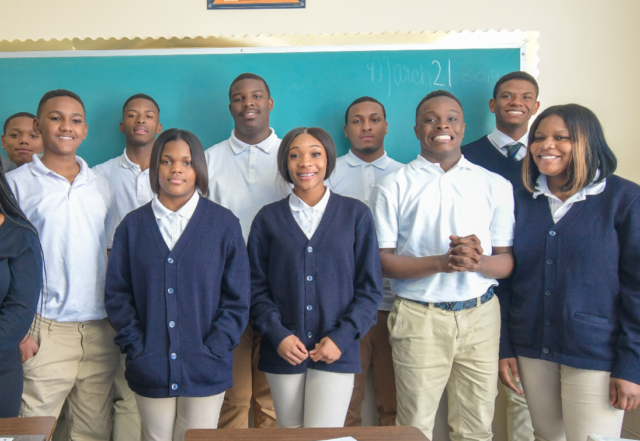
By Ameera Steward
The Birmingham Times
On a beautiful, cool day earlier this month, the wind blew, birds sang, and the laughter of children could be heard from the education building of Southside Baptist Church. To the right of that building, down a few steps, is a school for students whose outlook on the future may have seemed bleak.
Thanks to Maranathan Academy, a school that caters to critically at-risk students, these young people—some with little or no support system, others who have been expelled from school, had trouble learning, or may not have the best home life—can look forward to a bright future.
Maranathan Academy founder Donna Dukes, 48, started the academy in 1991, when she noticed that most children who are expelled from school don’t receive a second chance.
“I started feeling like I needed to start a school for these kids who nobody wanted, who nobody wanted to work with,” she said. “I didn’t want to feel that so I kept praying, tried to get that prayed … away, but it wouldn’t go away.”
The school used to be in the Kingston community home Dukes’ mother grew up in. Her mother told her she could use the house, “so that’s what I did,” said Dukes, who graduated from Miles College in May 1991.
In September of that year, Dukes opened the school with one student, one table, and four chairs. Now, 27 years later, Maranathan Academy has graduated more than 300 young people and had a positive impact on more than 1,500 lives, when including families.
Maranathan has since outgrown its original home and now operates at Southside Baptist Church in Five Points South.
Rewarding
Today, 14 students are enrolled, and 52 students are on their waiting list “that really need our help,” said Dukes.
Among the students at Maranathan Academy are young people like Iyana Byrd, who recently joined after being bullied at her former school, where she was jumped and left with a broken wrist. She enjoys her new environment and classmates.
“I talk to everyone, and they help with the work, … they talk it out,” Byrd said. “At my last school, we didn’t do that.”
Students like Keltyn Young, expelled a year ago from his former school for bringing a gun to the facility, said, “I just feel better here.”
Young admitted that at his other school, he would probably argue or lose his temper with classmates, but at Maranathan, “I can cooperate with them.”
The most rewarding feeling in the world is to see “my precious babies go on to great things, to see a kid who literally did not have hope morph into a productive, contributive member of society,” Dukes said.
“You can look in someone’s eyes and see what they’re feeling. Critically at-risk youth have no hope. They don’t know how to dream. They don’t have hope. In order to have dreams you have to have hope, in order to have hope you have to feel safe, in order to feel safe, you have to feel loved and valued. They don’t feel any of that. After working with them at Maranathan, they know they’re safe, they know they’re loved, they have hope.”
Curriculum
The Maranathan Academy program accepts children from sixth through twelfth grades, and students are grouped by age: grades six, seven, and eight; grades nine and ten; and grades eleven and twelve.
Dukes said some of these young people have endured unspeakable things that don’t make sense in the minds of kids: “They’ve been disenfranchised enough. They’ve been made to feel different enough. I want them to feel, at least here, that they’re just kids.”
The nonprofit school is run just like any other institution with a curriculum that meets state of Alabama requirements. In addition, subjects like black history are required, which differs from many other schools that may teach it only during Black History Month.
The black history requirement is important to Dukes for several reasons. Her father, Frank Dukes, was student government president at Miles College and co-created the Selective Buying Campaign of 1962 with Jonathan McPherson, PhD, a Miles College professor during the Civil Rights Movement. Her 88-year-old father now teaches a black history course at Maranathan Academy.
“We want [students] to understand from whence they came and to take away the chip on their shoulders that a lot of them have about white people. We have to explain that there were whites who supported blacks not only during the Civil Rights Movement but also during the days of slavery and on the Underground Railroad,” Dukes said. “If we do it in that manner, then our kids understand that we are a lot more alike than we are different, and it helps them be more receptive to people of different ethnicities.
The course also instills pride in the students: “Once they finish that course, they’re walking tall, they’re proud of themselves because [they learn about] the things our people have done. Then they see, too, that they have no excuses because people who had way [more] obstacles than the ones they are facing went on to do great things.”
Maranathan’s students also practice yoga and tai chi, an internal Chinese martial art that focuses on both defense training and health benefits, and are required to take an etiquette course. Other classes include creative writing and Spanish, and anatomy and physiology classes are already part of the course offerings at Maranathan Academy.
Growth
Over the past 25 years, Maranathan Academy has grown, and it has outgrown its space. Since August 2018, the school has been operating at Southside Baptist Church, which has been “such a game changer … because, for the first time in 27 years, when we take our kids on walks around the neighborhood, we can complete the walk,” Dukes said.
“Now [we’re in] Five Points South, so we’re able to walk around, and the kids see people going to work, to lunch, to [the University of Alabama at Birmingham]. … Our kids are able to see actual college students, medical school students, … some who look like them and some of them who don’t.
“[Our students do] all the things they would normally do in public school. It’s really important for them to still feel like they’re a part of a traditional setting, even though it’s one that accommodates their special circumstance.”
For 22 years, Maranathan Academy was located in the house where Dukes and her siblings were reared. It then moved to Hopewell African Methodist Episcopalian (AME) Church in Kingston and Ninevah Baptist Church in East Lake, before moving to its current location at the Southside Baptist Church in Birmingham’s historic Five Points South.
Students graduate in June and December, and it’s just like any other graduation: caps, gowns, invitations, and portraits are included. The only difference is that, because the school is a nonprofit and graduation isn’t included in the scholarship fund, each child needs a sponsor.
Sponsors
Whenever necessary, sponsors are secured to cover the graduation expenses of high school seniors. Every student that successfully completes his or her course of studies graduates, and securing a sponsor when a senior cannot afford his or her graduation expenses ensures that every child who has satisfied academic requirements will be able to have the full cap-and-gown high school graduation experience.
Dukes said the number of students they have per year depends on how much money they’re able to raise.
“That waiting list drives me a lot to try and get more funding because that’s the only thing that stops us from being able to help more kids,” she said. “[With] … more funding, we can have more kids and more teachers … and more things will be able to transpire for these precious … young people.”
Maranathan Academy is a scholarship-based school, and $10,000 a year covers uniforms, textbooks, tuition, passes for Birmingham-Jefferson County Transit Authority (BJCTA) MAX bus service, lunches, field trips, and more. Scholarships are secured through fundraisers, foundations, churches, and donor-advised funds.
In addition to those who wish to donate, the academy also hosts two events a year. On May 9, the school is hosting a jazz concert at the Harbert Center in downtown Birmingham; tickets are $75, and the program will feature performances by jazz artists Marion Meadows, Caprenia Anthony, and Joey Sommerville and will honor jazz legend Eric Essix, who recently visited the school.
“Our motto is no donation is too small to make a big difference in the lives of critically at-risk youth,” said Dukes.
To learn more about Maranathan Academy, visit www.maranathanacademy.com or call 205-591-8100. To donate, visit www.maranathanacademy.com/ways-to-get-involved; checks and money orders can be mailed to Maranathan Academy, P.O. Box 320321, Birmingham, AL 35232.
Updated on 4/1/2019 at 9:30 a.m. to correct the number of courses offered at Maranathan Academy.

